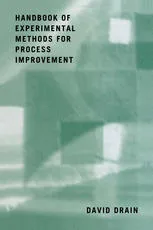Handbook of Experimental Methods for Process Improvement
4.9
بر اساس نظر کاربران

شما میتونید سوالاتتون در باره کتاب رو از هوش مصنوعیش بعد از ورود بپرسید
هر دانلود یا پرسش از هوش مصنوعی 2 امتیاز لازم دارد، برای بدست آوردن امتیاز رایگان، به صفحه ی راهنمای امتیازات سر بزنید و یک سری کار ارزشمند انجام بدینمعرفی کتاب "Handbook of Experimental Methods for Process Improvement"
کتاب "Handbook of Experimental Methods for Process Improvement" یک مرجع جامع و حرفهای برای بهبود فرایندها به کمک روشهای تجربی است. این کتاب بهعنوان پلی میان دانش گسترده آکادمیک و کاربردهای عملی آن در صنعت طراحی شده است. با استفاده از تکنیکهایی نظیر Design of Experiments (DOE)، Statistical Process Control (SPC)، و روشهای نوآورانه دیگر، این اثر به خوانندگان کمک میکند تا ابزارهای علمی را برای تجزیه و تحلیل و بهبود فرایندهای پیچیده بهکار گیرند.
این کتاب برای مهندسین فرایند، مدیران کیفیت، پژوهشگران و هر کسی که بهدنبال موثرتر کردن فرایندها، کاهش هزینهها و افزایش بهرهوری است، نوشته شده است. با محتوای فشرده و عملی، خواننده قادر خواهد بود درک خود از عملکرد سیستمها را بهبود داده و تصمیماتی بر پایه دادههای واقعی بگیرد.
خلاصهای از کتاب
این کتاب در سه بخش کلی سازماندهی شده است:
- بخش اول: معرفی اصول پایه و مبانی ابزارهای آماری برای آزمایش و تحلیل. در این بخش توضیحاتی جامع در مورد مفاهیمی مثل Randomization، Replication، و Blocking ارائه میشود.
- بخش دوم: تمرکز بر روشهای طراحی آزمایش شامل Factorial Designs، Taguchi Methods، و Response Surface Methodology (RSM) و کاربردهای آنها در محیطهای صنعتی.
- بخش سوم: بهبود فرایند از طریق شناسایی موانع، اجرای ابزارهای Statistical Process Control و استفاده از Case Studyهای واقعی برای یادگیری عملی.
این کتاب نهتنها به مبانی فنی میپردازد بلکه با توضیحات ساده و کاربردی، اهداف عملی را نیز قابل دستیابی میکند.
نکات کلیدی
- یادگیری اصول Design of Experiments (DOE)
- کاربرد تکنیکهای آماری برای کاهش خطا و افزایش دقت
- فهم عمیق از نحوه اجرای Statistical Process Control (SPC)
- استفاده از Case Studyهای واقعی برای یادگیری عملی
- ایدههایی برای بهبود مداوم و کاهش هزینههای تولید
این نکات به مخاطبان کمک میکند تا دانش خود را فراتر از چارچوب تئوری برده و ابزارها را برای حل مشکلات پیچیده بهکار گیرند.
نقلقولهای معروف از کتاب
"Improvement without experimentation is like surgery without a diagnosis – you may fix nothing, or worse, harm what is healthy."
"In the pursuit of process improvement, data is your most reliable compass and experimentation your strongest ally."
"A process improved is productivity unleashed."
نکات فلسفی و عملی مانند این جملات، روح اصلی کتاب را منعکس میکند.
چرا این کتاب مهم است؟
در دنیای امروز، بازارها با سرعت سرسامآوری در حال تغییر هستند و فرایندهای ناکارآمد نه تنها منابع را تلف میکنند، بلکه شرکتها را از رقابت باز میدارند. این کتاب با تمرکز بر ابزارهای علمی و اثباتشده به حرفهایها و دانشجویان کمک میکند تا:
- مشکلات پنهان در سیستمهای پیچیده را شناسایی کنند.
- از دادهها برای تصمیمگیری بهتر بهره ببرند.
- بهرهوری و کیفیت را بهبود بخشند.
- تکنیکهای پیشرفته را با پروژههای روزمره ادغام کنند.
این کتاب تجمیعی از دانش نظری و تجربیات عملی است که نهتنها در محیطهای صنعتی، بلکه در هر سیستمی که قصد بهبود دارد، مؤثر خواهد بود.
Introduction to the Handbook of Experimental Methods for Process Improvement
Welcome to the Handbook of Experimental Methods for Process Improvement, a comprehensive guide crafted to empower professionals, researchers, and organizations with the tools and techniques needed to enhance their processes systematically. Whether you are a project manager seeking to streamline workflows, an engineer aiming to optimize manufacturing lines, or an analyst looking to eliminate inefficiencies, this book serves as your go-to resource for data-driven experimental approaches. Filled with practical insights, proven methodologies, and actionable examples, it bridges the gap between theory and real-world application.
This handbook provides a step-by-step roadmap for understanding and implementing experimental tools, such as Design of Experiments (DOE), Statistical Process Control (SPC), and Lean Six Sigma principles. It focuses on demystifying complex methods, ensuring they are accessible to beginners while remaining invaluable to seasoned professionals. By reading this book, you’ll discover how to harness the power of experiments not only to solve technical challenges but also to drive organizational growth and efficiency.
Detailed Summary of the Handbook
Structured to align with the needs of modern process improvement practitioners, the book begins with an overview of why experimental methods are essential for driving sustainable improvements. The first section covers fundamental concepts, including the scientific approach to problem-solving, the importance of data, and the foundational principles of hypothesis-driven experimentation.
The focus then shifts to practical strategies and tools. You’ll learn core techniques like factorial design, ANOVA (Analysis of Variance), and response surface methodology, all explained with relatable examples. The book systematically introduces simple methods, such as Pareto analysis and Ishikawa diagrams, before advancing to multivariate analysis, simulation, and regression modeling. It also includes real-world case studies from industries such as healthcare, manufacturing, and software development.
Beyond the technical aspects, the book addresses critical process elements, such as fostering stakeholder buy-in, building cross-functional teams, and nurturing a culture of continuous improvement. Additionally, it provides guidance on how to interpret experimental results effectively, ensuring that your insights translate into measurable and meaningful changes.
Key Takeaways
- Understand the principles and essential techniques of experimental design and analysis.
- Learn how to identify, define, and prioritize improvement opportunities in processes.
- Master statistical methods like ANOVA and regression to draw actionable insights from data.
- Explore case studies and examples that demonstrate real-life applications of experimental methods.
- Gain tips and strategies for overcoming challenges, such as resistance to change or data limitations.
Famous Quotes from the Book
"Every improvement begins with a question—what can be done better, faster, or smarter?"
"Experimentation is not trial and error; it’s a structured journey toward understanding and excellence."
"Data is the light that illuminates inefficiencies and guides you toward solutions."
Why This Book Matters
In today’s rapidly evolving business landscape, the ability to adapt and improve processes is a critical differentiator. Organizations face constant pressure to enhance quality, reduce costs, and deliver value faster. This book equips you with a proven framework for meeting these challenges head-on. By emphasizing a systematic approach to experimentation, it allows you to make evidence-based decisions, minimize risks, and achieve sustainable results.
Most importantly, the methodologies outlined in this handbook are not limited to a specific industry or role—they are universally applicable across sectors and functions. In a world increasingly reliant on data, mastering experimental methods is no longer optional; it’s a necessity. This book is your guide to embracing that necessity and transforming it into a competitive advantage.
Begin your journey into the world of process improvement today and become a champion of data-driven excellence. The Handbook of Experimental Methods for Process Improvement is your trusted companion in driving meaningful change, one experiment at a time.
دانلود رایگان مستقیم
برای دانلود رایگان این کتاب و هزاران کتاب دیگه همین حالا عضو بشین
برای خواندن این کتاب باید نرم افزار PDF Reader را دانلود کنید Foxit Reader


